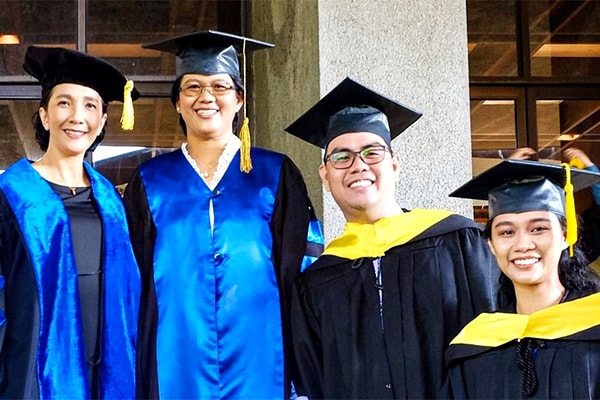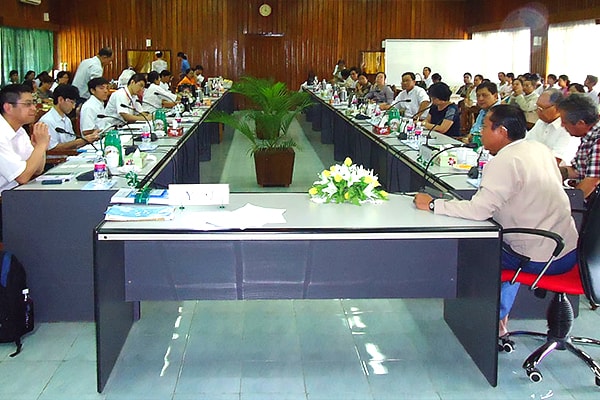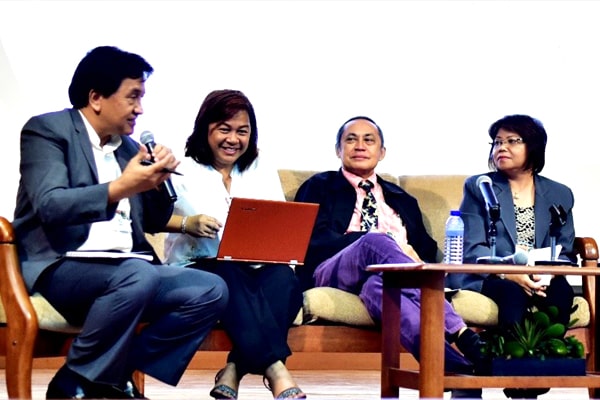Education and Collective Learning (ECL)

The Education and Collective Learning (ECL) program of SEARCA is a unique combination of two services which aims to lead in the development of a new breed of agriculture leaders and professionals that embody mindset transitions through graduate scholarships, institutional development assistance, technical trainings, and learning events. Under the ECL Department are two units, namely the Graduate Scholarship and Institutional Development (GSID) and Training for Development (T4D).
-
Graduate Scholarship and Institutional Development (GSID)
ECL's Graduate Scholarship and Institutional Development (GSID) traces its beginnings to SEARCA's Graduate Study Program which was initiated in academic year 1968-1969. Since then, it has expanded its scope to include institutional development, academic networking, and other services to enhance graduate education in the region. At the same time, SEARCA has an excellent track record in scholarship administration as a service to other institutions that invested in developing Southeast Asian professionals working in agriculture and rural development in the region.
To date, SEARCA awarded more than 1,700 scholarships to nationals of SEAMEO member countries, namely: Brunei Darussalam, Cambodia, Indonesia, Lao PDR, Malaysia, Myanmar, the Philippines, Singapore, Thailand, Timor-Leste, and Vietnam to pursue advanced studies leading to master's and doctoral degrees in agriculture, forestry, and related sciences.
For its Eleventh Five-Year Plan, SEARCA aims to Accelerate Transformation through Agricultural Innovation (ATTAIN) by creating agents of change and thought leaders who will transform the landscape of agricultural and rural development. To do this, GSID connects students, professionals, scientists, executives, teachers, and even progressive farmers to SEARCA's partner universities and research institutions to pursue graduate studies and professional learning in fields significant to the SDGs. GSID also continues to provide assistance to empower and equip universities that are strategically located in growth areas to boost economic development in the region.
Graduate Scholarship and Professorial Chair Grants
 GSID offers degree and non-degree scholarship opportunities for graduate programs to highly qualified nationals of SEAMEO member countries. To increase these opportunities for advanced studies, SEARCA actively seeks partnerships with institutions for specialized areas of study along its priority thrusts. GSID also endeavors to internationalize higher education by sustaining these partnerships with international education networks and promoting new collaborations with industries and government agencies. It is also the lead unit at SEARCA for serving as Secretariat of the Southeast Asian University Consortium for Graduate Education in Agriculture and Natural Resources (UC).
GSID offers degree and non-degree scholarship opportunities for graduate programs to highly qualified nationals of SEAMEO member countries. To increase these opportunities for advanced studies, SEARCA actively seeks partnerships with institutions for specialized areas of study along its priority thrusts. GSID also endeavors to internationalize higher education by sustaining these partnerships with international education networks and promoting new collaborations with industries and government agencies. It is also the lead unit at SEARCA for serving as Secretariat of the Southeast Asian University Consortium for Graduate Education in Agriculture and Natural Resources (UC).SEARCA is implementing the following joint scholarship projects with its partner institutions:
- DAAD In-Country/In-Region Scholarship Programme
- Tokyo NODAI-SEARCA Scholarship for Dissertation Doctorate
- Universiti Putra Malaysia (UPM)-SEARCA Joint Scholarship
- UPM-Agropolis Fondation-SEARCA Joint Scholarship
- Sejong University-SEARCA Joint Graduate Research Scholarship
- National Taiwan University (NTU)-SEARCA Joint Scholarship for Master's in Global Agricultural Technology and Genomic Science (ATGS)
- Bulacan State University (BulSU)-SEARCA PhD Scholarship
- Nagoya University-SEARCA Joint PhD Research Scholarship
- Philippine Carabao Center (PCC)-SEARCA Scholarship
GSID also recognizes academic excellence and innovation in the fields of agriculture and related sciences through the SEARCA Regional Professorial Chairs awarded to outstanding Southeast Asian experts in the academe.
In addition, GSID leads capacity-building initiatives that will strengthen academic and research competencies of universities and agricultural research institutions in the region in order to extend innovative solutions to regional challenges and pressing industry problems.
SEARCA's graduate scholarship alumni are organized into the Regional SEARCA Alumni Association (RSAA), with country chapters in the different SEAMEO member countries. Through GSID, SEARCA continuously strengthens its alumni relations by providing support to alumni-led activities such as its biennial conferences, regional consultative workshops, seminars, RSAA executive board meetings and the recent book writing project. SEARCA considers its alumni as formidable partners in promoting its mandate in the region.
Institutional Development Assistance
 With SEARCA's keen focus on Accelerating Transformation through Agricultural Innovation (ATTAIN) as set forth by its Eleventh Five-Year Plan, GSID is also helping young and strategic higher education institutions with core competencies in agriculture related disciplines to become catalysts of development in their countries.
With SEARCA's keen focus on Accelerating Transformation through Agricultural Innovation (ATTAIN) as set forth by its Eleventh Five-Year Plan, GSID is also helping young and strategic higher education institutions with core competencies in agriculture related disciplines to become catalysts of development in their countries.SEARCA's Institutional Development Assistance (IDA) targets agricultural universities that are lagging in academic capacities but are strategically located in economic growth areas and expected to play a vital role in its country's social and economic development.
SEARCA's IDA partner universities include:
- Royal University of Agriculture (RUA), Cambodia
- Savannakhet University (SKU), Lao PDR
- Yezin Agricultural University, Myanmar
- National University of Timor Leste
- Thai Nguyen University of Agriculture and Forestry, Vietnam
SEARCA's assistance to its IDA partners vary according to the needs of each university. In the last five years, SEARCA has conducted the following activities as part of its IDA program:
- Strategic Review and Planning
- Mentoring Workshop on Strategic Planning
- In-country training/short courses/conferences
- Short course on Utilization of Indigenous Crops to Strengthen Food Security
- Short course on Water Resources Management for Smallholder Farmers
- Short course on Climate-Agriculture-Impact Modelling
- Short course on General Education (GE) Program in Addressing Food Security
- Training on communication skills
- Development of a Curriculum on Agricultural Extension as a new Specialization area in the Bachelor of Agricultural Science program
- Offering of graduate degree (MS/PhD) and non-degree scholarships for faculty development
-
Training for Development (T4D)
ECL's Training for Development (T4D) Unit began as a Short-Term Training Program (STTP) in 1970 as the Center's fast lane to imbuing Southeast Asian agricultural development and environmental leaders, academicians, researchers, and practitioners with technical and managerial competencies to build institutional capacities in the region. Through this capacity development modality, SEARCA is able to provide continuing learning opportunities to mid- and top-level government and nongovernmental personnel in the region who are unable to engage in long-term graduate studies; or as follow-up after their graduate studies.
 In collaboration with various international development organizations and national agencies, SEARCA conducts training programs catered to participants who can create the greatest influence in the agricultural and rural development sector in the region.
In collaboration with various international development organizations and national agencies, SEARCA conducts training programs catered to participants who can create the greatest influence in the agricultural and rural development sector in the region.It aligns its training programs with current thinking in capacity development in accelerating transformation through agricultural innovation and through such programs, SEARCA captures the tacit knowledge of practitioners to contribute to knowledge bases.
To date, SEARCA's training programs has produced more than 16,000 training alumni from the 11 member countries of the Southeast Asian Ministers of Education Organization (SEAMEO), which include Brunei Darussalam, Cambodia, Indonesia, Lao PDR, Malaysia, Myanmar, Philippines, Singapore, Thailand, Timor-Leste, and Vietnam. Additionally, SEARCA has produced almost 1,000 training alumni from 64 countries across the world.
Across the years, SEARCA has developed and offered long-running training programs that had the following focus: data management for rural development (DMRD), development strategies and planning for farmers' communities (DSPFC), advanced higher education administrators development (AHEAD), sustainable agriculture for the uplands (SAU), strategies for rural development (SRD), and on-farm trials for technology verification (OFTTV).
T4D in SEARCA's 11th FYP
Under the 11th Five-Year Plan (FYP) of SEARCA, T4D will lead the implementation of technical and professional trainings of the Center to assist in the development of next generation agriculture leaders and professionals.
T4D bridges the gap between the different agricultural and rural development ecologies by addressing relevant and urgent needs through practical technical training programs and learning modules, via offline and online modalities, and focusing on social, policy, technological, institutional, and conceptual innovations.
It will handle events, round table discussions (RTD), fora, and conferences that will facilitate the wide sharing of best practices, practical and useful technologies, effective mindsets, and successes and lessons learned among the different stakeholders of SEARCA and different agriculture and rural development systems. With the lessons learned during the COVID-19 pandemic in terms of implementing learning events, T4D will explore multi-modal approach to learning (e.g., combination of instructor-led training with e-learning, mentorship, etc.) to ensure that its flow of service provision to the Center's stakeholders will not be hampered.
Within the next five years and as embodied in SEARCA's 11th FYP, T4D will organize and implement learning events focused on the following priority areas of the Center: Agri-Business Models for Increased Productivity and Income; Sustainable Farming Systems and Natural Resource Management; Food and Nutrition Security; Transformational Leadership for Agriculture and Rural Development; Gender and Youth Engagement in Agriculture and Rural Development; Enhanced Agriculture and Rural Development towards Climate Resilience; and Eco-Health/One-Health Applications to Agriculture and Rural Development.
Contact Information
For inquiries, please contact:
- Education and Collective Learning - Graduate Scholarship and Institutional Development (ECL-GSID)
Southeast Asian Regional Center for Graduate Study and Research in Agriculture (SEARCA)
College, Los Baños, 4031 Laguna, Philippines
Tel: +63 49 554 9330 to 39; +63 49 536 2290; +63 49 572 3743; +63 2 8657 1300 to 02 local 2200 to 2203
Fax: +63 49 536 7097
Email: - Education and Collective Learning – Training for Development (ECL-T4D)
Southeast Asian Regional Center for Graduate Study and Research in Agriculture (SEARCA)
College, Los Baños, 4031 Laguna, Philippines
Tel: +63 49 554 9330 to 39; +63 49 536 2290; +63 49 572 3743; +63 2 8657 1300 to 02 local 3500 to 3503
Fax: +63 49 536 7097
Email:



